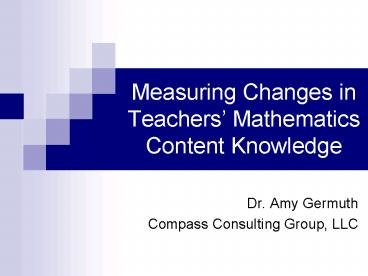Measuring Changes in Teachers - PowerPoint PPT Presentation
1 / 15
Title:
Measuring Changes in Teachers
Description:
Title: How to Access State Student Achievement Data Last modified by: Abt Associates Created Date: 11/14/2006 3:47:07 PM Document presentation format – PowerPoint PPT presentation
Number of Views:62
Avg rating:3.0/5.0
Title: Measuring Changes in Teachers
1
Measuring Changes in Teachers Mathematics
Content Knowledge
- Dr. Amy Germuth
- Compass Consulting Group, LLC
2
Overview of Session
- Introductions
- Importance of Measuring Teacher Content Knowledge
- Measuring Teacher Content Knowledge
- Discussion
3
Importance of Measuring Teacher Content Knowledge
- US ED MSP Program Office Perspective
- The Government Performance Results Act (GPRA)
- A law passed in 1993 that requires federally
funded agencies to develop and implement an
accountability system based on performance
measurement.
Importance of Measuring Teacher Content Knowledge
4
- Requires all federally funded program to
- Outline long-term and annual performance goals
that include outcomes, - Develop indicators to assess performance goals,
- Collect and analyze data on the indicators, and
- Report progress toward achieving performance
goals based on GPRA data and data from grantees
evaluations. - MSP GPRA indicator related to content knowledge
- The percentage of MSP teachers who significantly
increase their content knowledge, as reflected in
project-level pre- and post-assessment
Importance of Measuring Teacher Content Knowledge
5
- GPRA and grantee evaluation findings are used by
Congress to inform appropriations they want
concrete evidence of results - More uniform and higher quality data will enable
the MSP Program office to more accurately and
convincingly assess progress toward MSP
performance goals - This is challenging for measuring changes in
teachers content knowledge
Importance of Measuring Teacher Content Knowledge
6
- MSP Grantee Perspective
- Has the potential to affect funding of the
program at federal level - US ED annual reporting requirement
- One of the more direct variables for individual
partnerships to measure and demonstrate program
outcomes
Importance of Measuring Teacher Content Knowledge
7
Measuring Teacher Content Knowledge
- Because of the variability in the activities
projects are implementing to improve teacher
content knowledge the use of one instrument is
not a viable solution - Some instruments are better than others
- Search for or develop an instrument that
- Is aligned with the content of your MSP
professional development activity - Has been piloted with teachers similar to those
participating in your program
Measuring Teacher Content Knowledge
8
- Provides evidence of reliability or the extent to
which an instrument yields consistent, stable,
and uniform results over repeated administrations
under the same conditions each time - Provides evidence of validity or the extent to
which 1) the instrument measures the skills it
sets out to measure and 2) the inferences and
actions made on the basis of the scores are
appropriate and accurate
Figure obtained from the website
http//www.socialresearchmethods.net/KB/relval.ht
m
Discussion Question What instruments have
grantees been using? What are the properties of
those instruments?
Measuring Teacher Content Knowledge
9
Potential Tests
- Learning Mathematics for Teaching (LMT) Project
University of Michigan - Includes several surveys that measures teachers
content knowledge for teaching mathematics in
Number and Operations(K-6, 6-8), Patterns,
Functions, and Algebra (K-6, 6-8), and Geometry
(3-8) - http//sitemaker.umich.edu/lmt/about
- Diagnostic Teacher Assessments in Mathematics and
Science (D-TAMS) - University of Louisville - Six versions of four different pre-post
assessments designed to assess change in teacher
content knowldge are available Number /
Computation, Geometry / Measurement, Probability
/ Statistics, and Algebraic Ideas. - http//louisville.edu/edu/mathscience/diagnostic.h
tml - Knowing Mathematics for Teaching Algebra (KAT)
Michigan State University - Instruments not yet available
- http//www.msu.edu//kat/index.htm
10
- Resources
- Overview of reliability and validity
- http//writing.colostate.edu/guides/research/relva
l/index.cfm - http//www.socialresearchmethods.net/KB/
- http//www.socialresearchmethods.net/tutorial/Colo
si/lcolosi2.htm - Crocker, L. Algina, J. (1986). Introduction to
classical and modern test theory. Belmont, CA
Wadsworth. - Shultz, K. S. Whitney, D. W. (2005).
Measurement theory in action Case studies and
exercises. Thousand Oaks, CA Sage. - Information on established instruments
- http//www.apa.org/science/faq-findtests.html
- http//www.unl.edu/buros/
Measuring Teacher Content Knowledge
11
- Information on developing instruments
- Crocker, L. Algina, J. (1986). Introduction to
classical and modern test theory. Belmont, CA
Wadsworth. - Haladyna, T. M. (1999). Developing and validating
multiple-choice test items (2nd ed.). Mahwah, NJ
Erlbaum. - Osterlind, S. J. (1998). Constructing test items
Multiple-choice, constructed response,
performance, and other formats. Boston, MA
Kluwer. - Shultz, K. S. Whitney, D. W. (2005).
Measurement theory in action Case studies and
exercises. Thousand Oaks, CA Sage.
Measuring Teacher Content Knowledge
12
- When To Administer Your Test
- Administer the pretest immediately prior to the
MSP activity or college course - Administer the posttest after the MSP activity
and follow-up are complete, but within the same
school year as the initial MSP activity
Measuring Teacher Content Knowledge
13
- How to Determine Whether Teachers Have Made
Significant Gains - To report for GPRA, US ED needs a way to tell
whether the observed gains in teacher content
knowledge between the pretest and the posttest
are significant - US ED is proposing that projects use a
statistical test called a dependent t-test to
determine whether teachers have made significant
gains
Measuring Teacher Content Knowledge
14
- Proposed process
- The federal program office would supply grantees
with an Excel spreadsheet with embedded formulas
to do the needed calculations - Grantees would enter into the spreadsheet the
pretest scores and posttest scores for the
teachers they test - Grantees would use one spreadsheet per test
- The spreadsheet would calculate the needed
statistics and produce a report for grantees
showing the total number of teachers and the
number who showed significant gains - Grantees would report this information to US ED
through the Annual Performance Report - US ED would aggregate the information from all
grantees and use it for GPRA reporting
Measuring Teacher Content Knowledge
15
Discussion
- Experiences developing content knowledge
instruments - Challenges encountered in measuring changes in
content knowledge - Questions about measuring changes in content
knowledge































